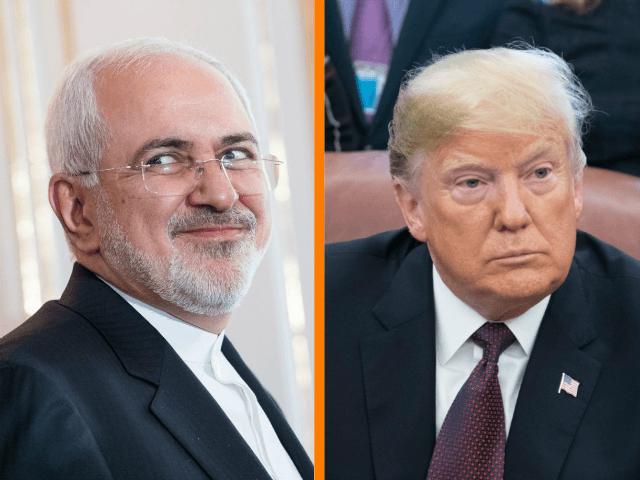Iranian Foreign Minister Mohammad Javad Zarif made an offer Wednesday for a prisoner exchange with the United States, without specifying which prisoners the Islamic Republic wants.
Zarif made the offer at the Asia Society in New York on Wednesday, which marked the 39th anniversary of the aborted 1980 mission to free American hostages in Iran under President Jimmy Carter. Eight American service members died despite Carter pulling the plug on the operation.
“I put this offer on the table publicly now: Exchange them. Let’s discuss them. Let’s have an exchange. I’m ready to do it, and I have authority to do it,” Zarif declared on Wednesday, according to the Associated Press (AP).
He reportedly claimed that Tehran made the offer to the Trump administration six months ago.
“Not a response yet,” Zarif alleged. “If they tell you anything else, they are lying.”
President Trump has been steadfast in liberating American prisoners held abroad, as evidenced by the 14 whose release he helped secure less than a year-and-a-half into his presidency.
In a statement responding to Zarif’s claims and obtained by AP, an unnamed State Department official said, “The Iranian regime can demonstrate its seriousness regarding consular issues, including Iranians who have been indicted or convicted of criminal violations of US sanctions laws, by releasing innocent US persons immediately.”
“We call on Iran to free all unjustly detained and missing US persons, including Xiyue Wang, Robert Levinson, Siamak Namazi, and Nizar Zakka, among others,” the official added.
The U.S. State Department did not explicitly address Zarif’s claim that he made the prisoner swap offer six months ago.
Zarif’s proposal also comes amid strained relations between Washington and Tehran after U.S. President Donald Trump pulled out of the 2015 Iran nuclear deal and reimposed a historic wave of sanctions on the Islamic Republic its leaders admit is having an impact.
Under Trump, the U.S. has also officially labeled the elite Islamic Republic’s Revolutionary Guard Corps (IRGC), a branch of the Iranian military, a terrorist organization. In response, Iran deemed U.S. Central Command (CENTCOM), charged with overseeing American military activities in the Middle East and South Asia, a terrorist group.
President Trump has also moved to end waivers that allow Tehran’s top oil customers to continue importing Iranian oil, vowing to impose sanctions on those countries that buy crude from the Islamic Republic after May 1.
Iran has responded to the U.S. sanctions and IRGC terrorist designation with various threats, even alluding to military action. Zarif slammed the Trump administration and some American allies on Wednesday for allegedly seeking a confrontation with the Islamic Republic.
Referring to Israeli Prime Minister Benjamin Netanyahu, Trump’s national security adviser, John Bolton; the crown prince of the United Arab Emirates, Mohamed bin Zayed; and the crown prince of Saudi Arabia, Mohammed bin Salman, Zarif said, ”The B Team is pushing US policy toward a disaster.”
He went on to ridicule the U.S. “obsession” with Iran and said Trump is “mistaken” that economic pressure will bring Tehran to its knees.
“President Trump believes putting pressure, bullying will bring us to the negotiating table so he can make this ideal deal he has in mind. I don’t know what that deal is,” he added.
Zarif made those comments during the same event in New York during which he offered the prisoner swap.
Currently, Iranian authorities are believed to be holding at least four Americans, including dual-nationals: former U.S. navy cook Michael White, Siamak Namazi, Karan Vafadari, and Xiyue Wang.
Iran is also reportedly holding Nizar Zakka, a U.S. permanent resident from Lebanon. FBI agent Robert Levinson, who allegedly vanished in Iran in 2007, remains missing.
Family and supporters of American hostages in Iran consider the charges against their loved ones bogus or unjustified.
“We believe their charges are phony,” Zarif said of Iranians held in America. “The United States believes the charges against these people in Iran are phony.

COMMENTS
Please let us know if you're having issues with commenting.